Hibiscus plants are beloved for their vibrant and showy blooms but can also attract unwanted pests. Luckily, homemade remedies can help you control these pesky insects without resorting to harsh chemicals. Natural pest control is essential for Hibiscus plants because it allows you to protect them from pests while minimizing harm to the environment.
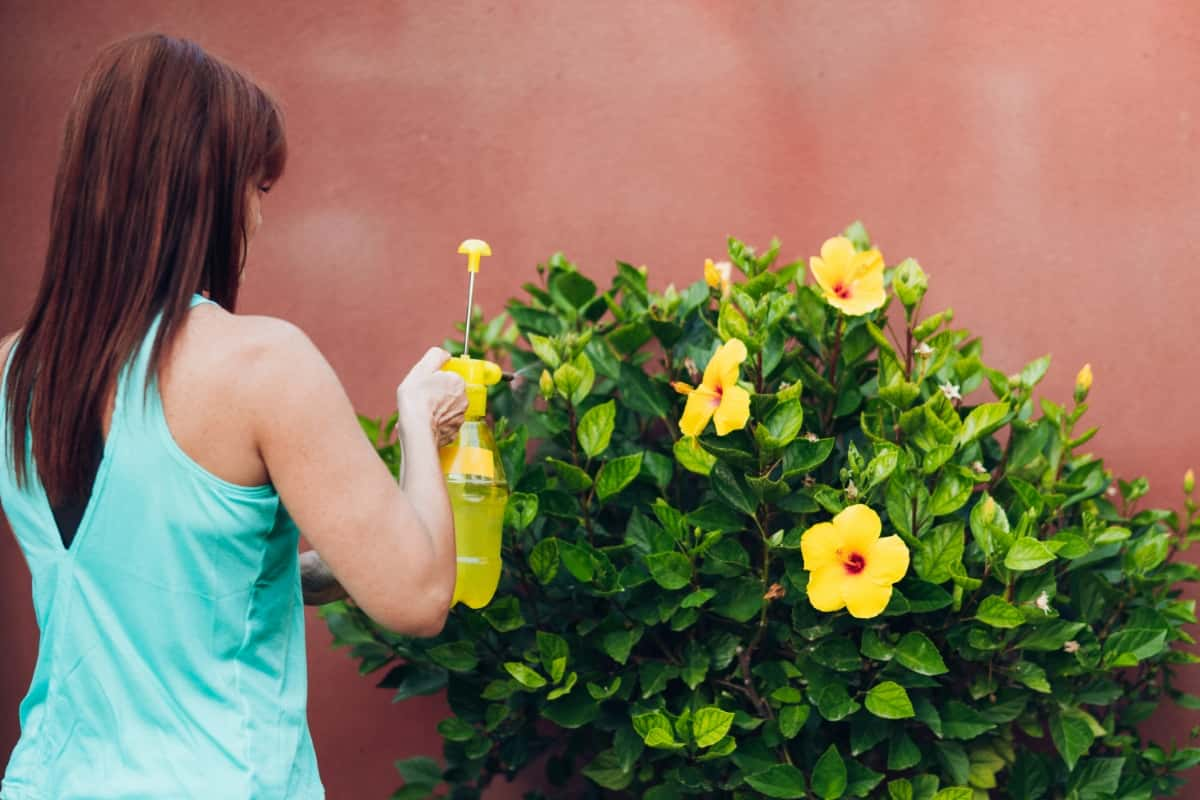
Several common pests can harm Hibiscus plants, including aphids, mealybugs, whiteflies, spider mites, scale insects, caterpillars, thrips, leafhoppers, fungal diseases, and nematodes. Each of these pests has unique characteristics and methods of attacking Hibiscus plants.
Homemade Insecticide for Hibiscus
Why Natural Pest Control is Essential for Hibiscus Plants
Hibiscus plants are a vibrant addition to any garden or landscape, with their stunning blooms and lush foliage. However, like any other plant, Hibiscus can fall prey to pests that wreak havoc on their health and beauty. That’s why natural pest control is essential when protecting these beloved plants. Using chemical pesticides may seem easy initially, but they can negatively affect the environment and harm beneficial insects.
Natural pest control methods offer a safer alternative that keeps your Hibiscus healthy while maintaining the delicate balance of your garden ecosystem. One of the greatest benefits of natural pest control for Hibiscus plants is that it avoids using harmful chemicals. Commercial pesticides contain toxic ingredients that kill pests and harm humans and animals. Opting for homemade remedies using organic ingredients can protect your Hibiscus without compromising your family’s or pets’ well-being.
Moreover, natural pest control promotes long-term sustainability in your garden. Chemical pesticides may provide immediate relief from pests but often lead to resistance over time, requiring stronger doses or more potent chemicals for effectiveness. Homemade insecticides for Hibiscus made from household items, such as soap sprays or neem oil, can help break this cycle by targeting pests without promoting resistance.
Common Pests that Harm Hibiscus Plants
Hibiscus plants are a delightful addition to any garden with their vibrant blooms and lush foliage. However, like other plants, they are prone to pests that can wreak havoc on their health and beauty. One common pest that can harm Hibiscus plants is the aphid. These tiny insects suck the sap from leaves and stems, causing leaves to curl and distort.
Another troublesome critter is the mealybug, which forms cotton-like clusters on plant surfaces, sucking out vital nutrients. Whiteflies are yet another nuisance for Hibiscus plants. They settle on the undersides of leaves and feed by piercing them with their sharp mouthparts. Spider mites are also frequent offenders; these minuscule arachnids spin fine webs over leaves while feeding on their sap. Scale insects pose a threat, as they attach themselves firmly to stems or leaves, forming a hard shell-like covering for protection.
In case you missed it: Homemade Insecticide for Houseplants: Homemade Remedies for Natural Pest Control on Houseplants
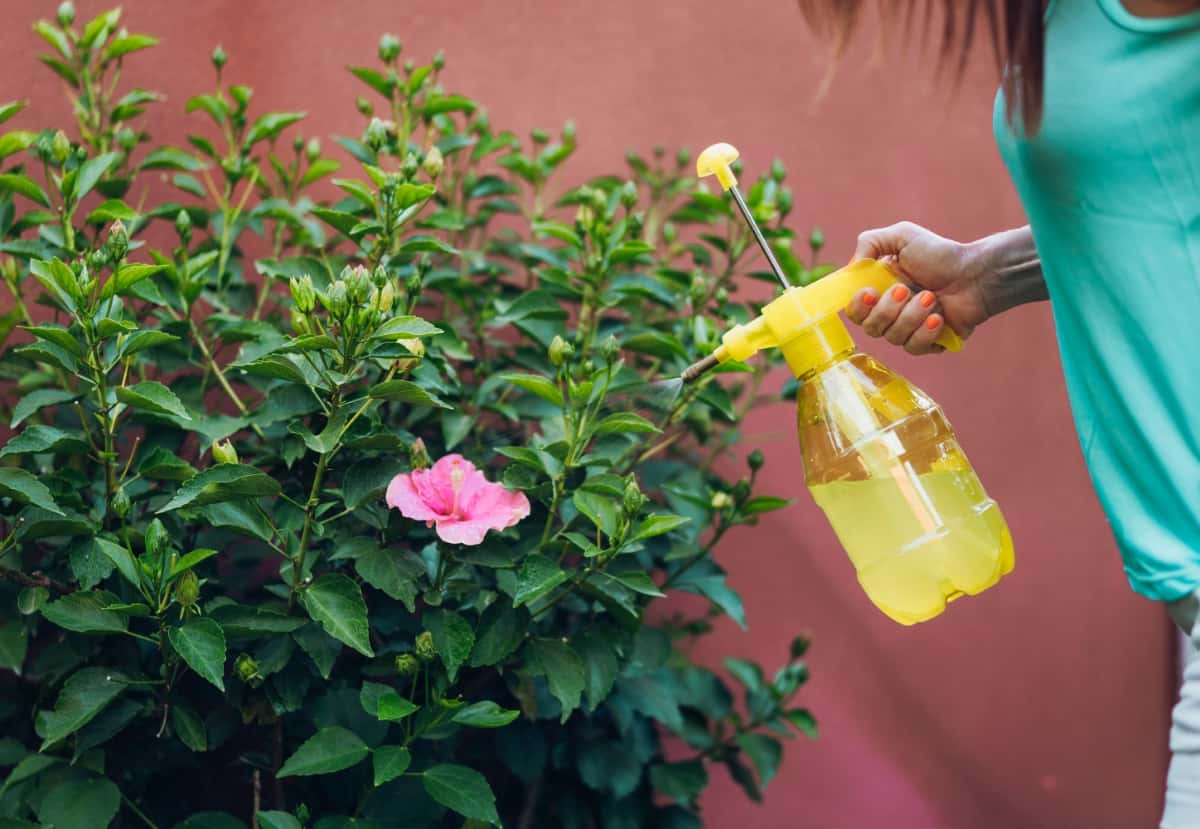
Caterpillars can also be problematic; these voracious eaters chew through leaves, leaving unsightly holes behind. Thrips infestations can cause serious damage, these tiny insects feed by rasping at plant tissue, resulting in distorted growth and silvering of leaves. Leafhoppers may plague Hibiscus plants by puncturing cells with their sharp mouthparts and injecting toxic saliva into the foliage.
Homemade Ways to Deal with Aphids on Hibiscus Plants
One of the effective Homemade insecticides for Hibiscus is using dish soap and water. Mix 2 to 3 drops of dish soap with water and spray it onto the aphid-infested leaves. The soapy solution will suffocate the aphids and prevent them from multiplying. Another natural option is neem oil. Neem oil has insecticidal properties that can help control aphid populations.
Natural Solutions for Mealybug Infestations on Hibiscus Plants
Mealybugs are tiny, soft-bodied insects that can wreak havoc on your beautiful Hibiscus plants. One effective method is using homemade insecticidal soap. Mix a tablespoon of mild liquid dish soap with one quart of water and apply it directly to the affected areas of your Hibiscus plants. The soap will suffocate the mealybugs while being gentle enough not to harm your plant.
An alternative method involves using rubbing alcohol as a spot treatment for mealybugs. Dabbing cotton swabs soaked in rubbing alcohol directly onto individual bugs will kill them instantly due to their high evaporation rate. Additionally, introducing beneficial insects into your garden can help control mealybug populations naturally since they feed on these troublesome pests.
Effective Homemade Pest Control for Whiteflies on Hibiscus Plants
Whiteflies are tiny, sap-sucking insects that can wreak havoc on your Hibiscus plants. One effective method for Controlling Whiteflies on Hibiscus Plants is to make a simple garlic spray. Crush a few garlic cloves and leave them in water overnight. Then, strain the mixture and apply it to the leaves of your Hibiscus plants.
In case you missed it: How to Grow Hibiscus from Cuttings to Harvest: Steps to Planting and Care
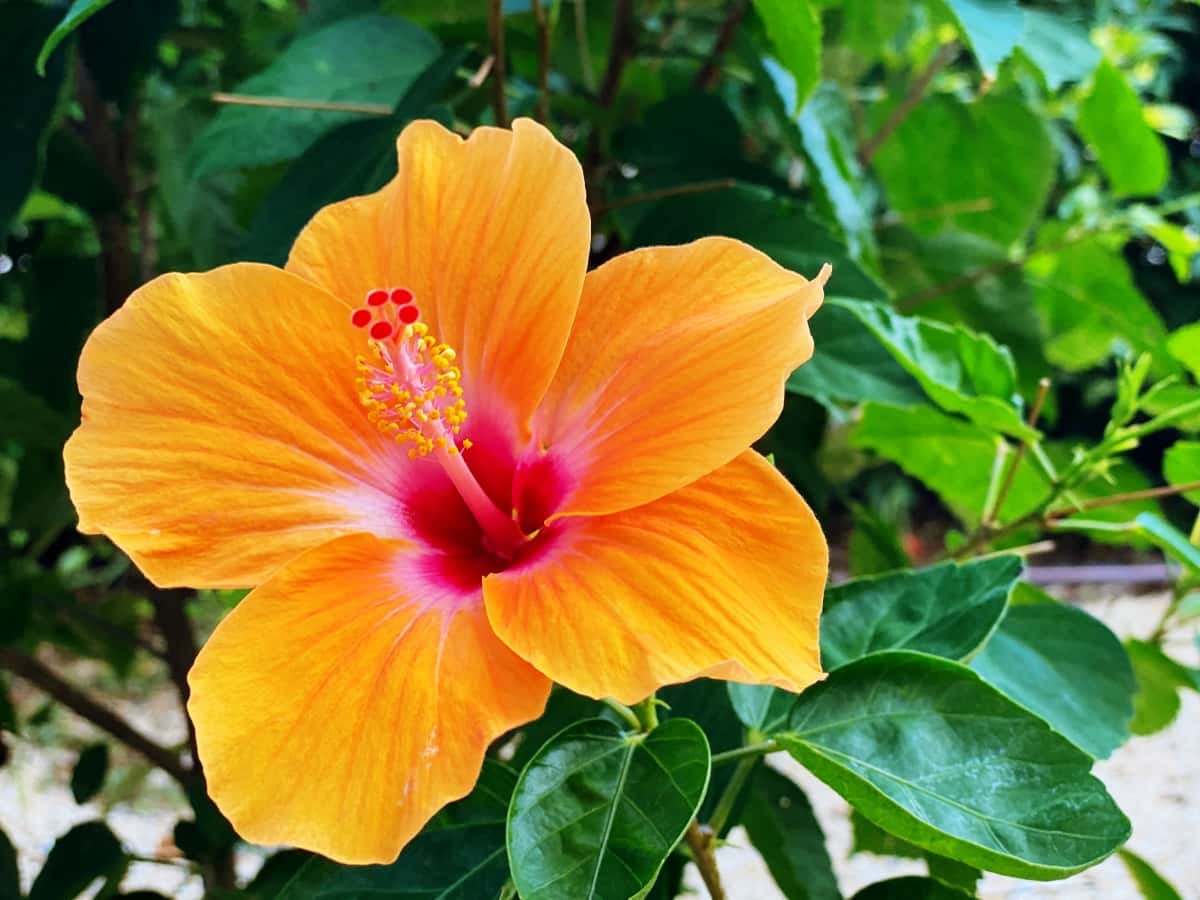
The strong smell of garlic will repel whiteflies and discourage them from settling on your precious blooms. Yellow sticky traps attract whiteflies with their bright color while trapping them with their sticky surface. Hang several traps around your Hibiscus plants to reduce populations over time.
Managing Spider Mites on Hibiscus Plants with Homemade Remedies
Spider mites can be a persistent and troublesome problem for Hibiscus plants. These tiny pests love to suck the leaves sap, causing them to turn yellow and eventually die off. But fear not; homemade remedies can help you manage spider mite infestations without resorting to harsh chemicals. One effective solution is a mixture of water and dish soap. Mix one to two tablespoons of mild liquid dish soap with water and spray it directly onto the leaves. The soap will suffocate the spider mites, effectively controlling their population.
If you prefer a more aromatic approach, consider using peppermint essential oil mixed with water as a spray. Spider mites dislike strong smells, so this homemade concoction may help deter them from infesting your Hibiscus plants. To prevent future infestations, regularly inspect your plants for any signs of spider mite activity and promptly remove any infected leaves or branches. Maintaining proper plant hygiene by keeping your garden free from debris can also prevent these pesky pests from taking hold.
Homemade Sprays to Combat Scale Insects on Hibiscus Plants
Scale insects are a common problem that many Hibiscus plant owners face. Luckily, there are homemade solutions you can use to combat scale insects without resorting to harsh chemicals. One effective homemade spray for scale insects on Hibiscus is a mixture of dish soap and water. Mix 2 to 3 drops of mild dish soap with hot water and shake well. Then, spray onto the affected areas of your Hibiscus plants, covering the leaves’ tops and bottoms.
If you don’t have access to neem oil or dish soap, another option is rubbing alcohol. Mix rubbing alcohol and water and apply it directly to the affected areas of your Hibiscus plants. The alcohol will dissolve the protective coating on the scales, eventually killing them. Always test any homemade sprays on a small area before applying them to your plants to ensure they won’t cause any damage or discoloration. Additionally, it’s important to be consistent with spraying as these remedies may not provide immediate results – persistence is key.
Organic Pest Control Methods for Caterpillars on Hibiscus Plants
Caterpillars can wreak havoc on your beautiful Hibiscus plants, munching away at the leaves and leaving behind unsightly damage. One effective method to control Caterpillars on Hibiscus is handpicking. It may seem tedious, but manually removing caterpillars from your Hibiscus plants can be satisfying. Simply inspect your plants regularly and pluck off any caterpillars you find. Be sure to dispose of them far from your garden to prevent re-infestation.
In case you missed it: 15 Common Hibiscus Plant Problems: How to Fix Them, Solutions, and Treatment
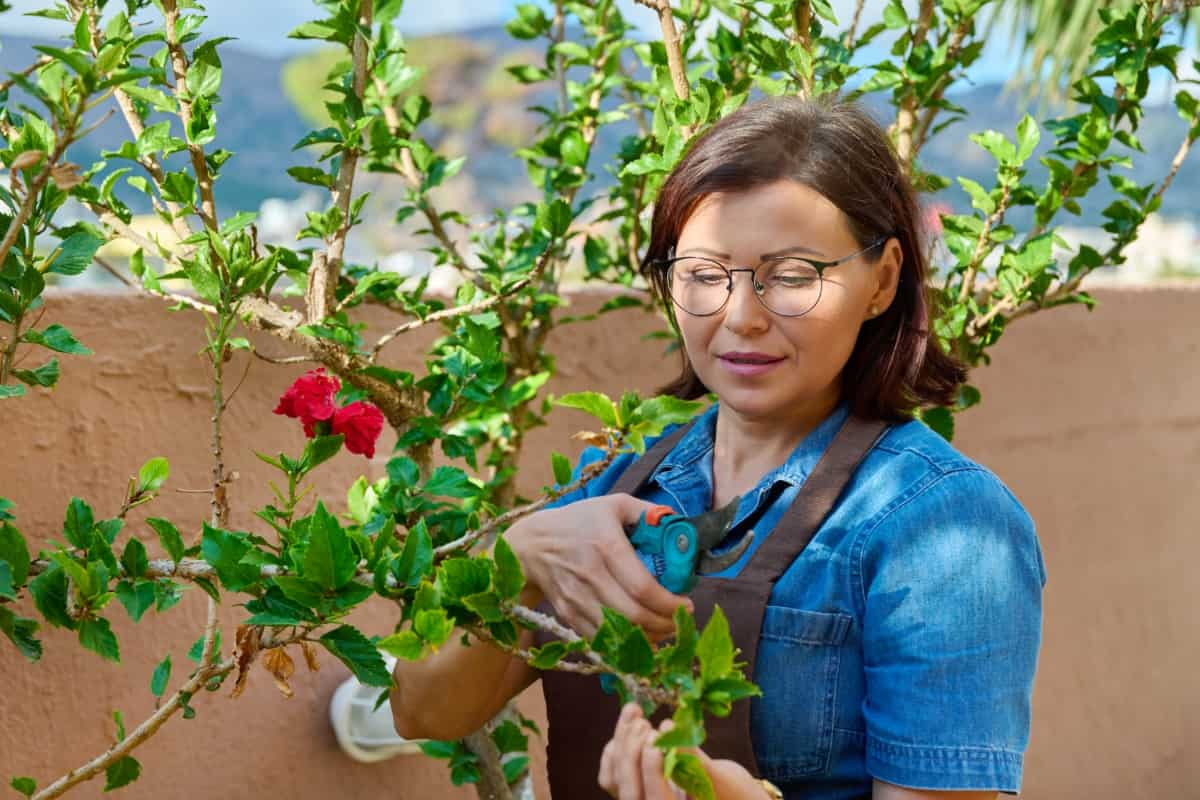
Another natural solution is neem oil spray. Mix 2 to 3 tablespoons of neem oil with water and thoroughly coat your Hibiscus plants with the solution. Reapply every week or after rainfall. You can also attract beneficial insects to help control caterpillar populations in your garden. These predatory insects feed on caterpillars and their eggs, providing an environmentally friendly way to keep their numbers in check.
Homemade Solutions for Thrips Infestations on Hibiscus Plants
Thrips, those tiny pests that can wreak havoc on your Hibiscus plants. These pesky insects feed on the leaves and buds, causing damage and stunting growth. One effective method is using neem oil spray. Neem oil acts as a deterrent for thrips while also suffocating them. Simply mix one teaspoon of neem oil with one quart of water and apply it to your plants every few days until the infestation subsides.
Another option is making garlic spray. Thrips hate the smell of garlic, so you can keep them away from your Hibiscus plants by creating a homemade garlic spray. Crush several cloves of garlic and let them steep in hot water overnight. Strain the mixture, dilute it with water, and spray it onto your plants.
If you prefer non-spray methods, consider introducing beneficial insects into your garden. These natural predators will feast on thrips and help control their population. Regularly pruning infected areas can help remove adult thrips and their eggs from your plants. Always monitor your Hibiscus plants closely for signs of thrip activity to catch an infestation early before it spreads throughout your garden.
Controlling Leafhopper Populations with Homemade Insecticides
Leafhoppers can be a nuisance for Hibiscus plants, causing damage to the leaves and stunting their growth. One effective method to control leafhoppers on Hibiscus is to create a garlic spray by blending several garlic cloves with water. Strain the mixture and pour it into a spray bottle. This pungent concoction is a natural repellent for leafhoppers, deterring them from infesting your Hibiscus plants. Another option is to make a neem oil solution by mixing neem oil with water and adding a few drops of dish soap.
Neem oil has insecticidal properties that can disrupt the life cycle of leafhoppers and other garden pests. Additionally, you can use a mixture of hot pepper flakes or powder steeped in water overnight. The spicy nature of this solution will repel leafhoppers without causing harm to your Hibiscus plants. Always test any homemade insecticide on a small section of your plant before applying it fully. This will ensure that your Hibiscus remains unharmed while effectively controlling leafhopper populations naturally.
Homemade Remedies for Fungal Diseases on Hibiscus Plants
Fungal diseases can be a real headache when caring for your Hibiscus plants. One effective solution is neem oil, which has antifungal properties. Mix 2 to 3 tablespoons of neem oil with water and spray it onto the affected areas of your Hibiscus plant. This will help control fungal growth and prevent further damage.
In case you missed it: Growing Hibiscus Plants in Pots from Cuttings, Seeds
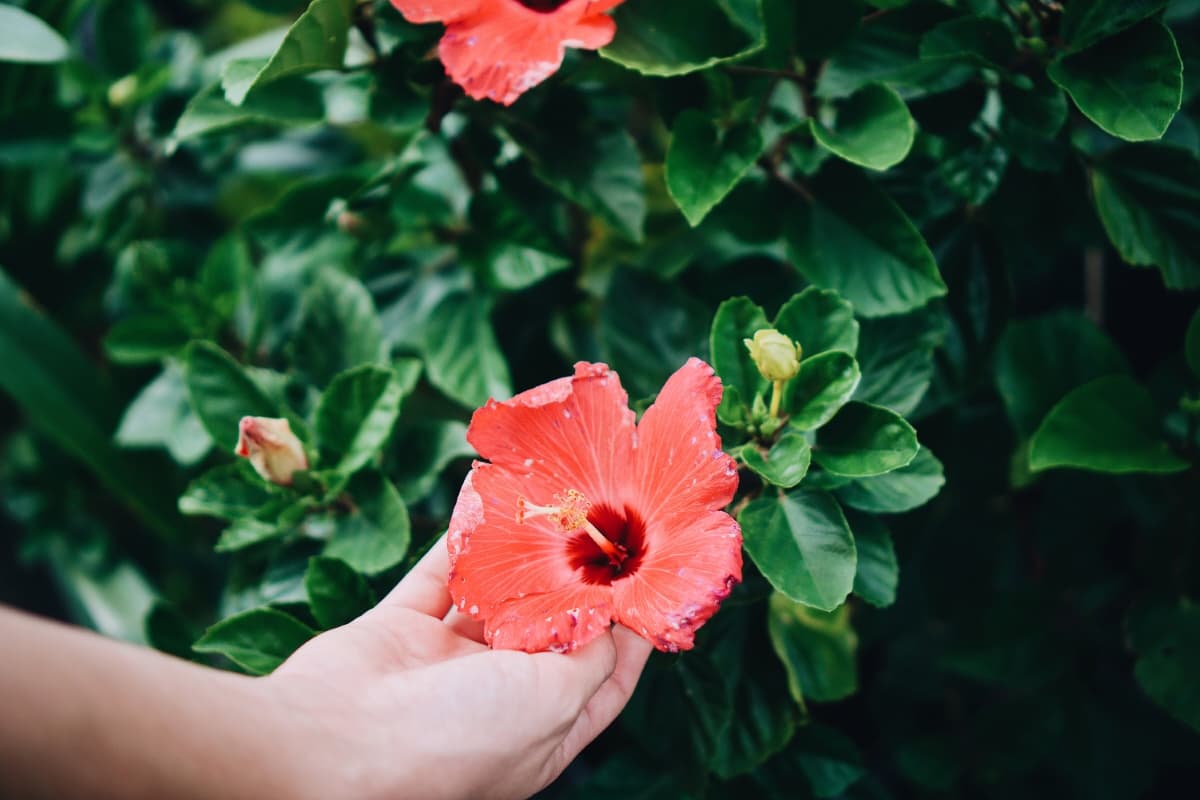
Another natural remedy is a baking soda solution. Mix one teaspoon of baking soda with one quart of water and apply it to the infected parts of your Hibiscus plant. Baking soda creates an alkaline environment that inhibits fungal growth. Garlic also has antifungal properties, making it an excellent homemade remedy for fungal diseases on Hibiscus plants. Crush several garlic cloves and steep them in water overnight. Strain the mixture and use the garlic-infused water as a spray on your infected plants.
Natural Pest Control Measures for Nematodes in Hibiscus Gardens
Nematodes can wreak havoc on your beloved Hibiscus plants, causing stunted growth and yellowing of the leaves. One effective method is using marigold plants as a companion to your Hibiscus. Planting marigolds around your Hibiscus can create a protective barrier against these pesky creatures.
Another natural solution is incorporating beneficial nematodes into your garden soil. These microscopic organisms feed on the harmful nematodes, reducing their population and preventing further damage to your Hibiscus plants. Additionally, practicing good sanitation techniques can help control nematode infestations. Removing any infected plant material and regularly cleaning gardening tools helps prevent the spread of nematodes throughout your garden.
Frequently Asked Questions on Homemade Insecticide for Hibiscus
What Ingredients Can I Use in Homemade Insecticide?
Try neem oil, garlic, vinegar, soap, and chili peppers. These substances have natural properties that deter pests while being safe for your Hibiscus.
How Do I Make Homemade Insecticide for My Hibiscus?
The recipes may vary depending on the specific pest problem you’re dealing with. However, a general recipe could involve mixing water with one or more ingredients and applying it directly onto the plants using a spray bottle.
Is Homemade Insecticide Safe for My Hibiscus Plant?
When used correctly and in moderation, homemade insecticides are generally safe for Hibiscus plants. However, testing any new mixture on a small area first ensures it doesn’t cause any adverse effects before applying it all over your plant.
How Often Should I Apply Homemade Insecticide on My Hibiscus?
The frequency depends on several factors, such as the severity of infestation and weather conditions; however, once every two weeks is usually sufficient unless stated otherwise in specific recipes or instructions.
In case you missed it: Best Fertilizer for Hibiscus: Homemade, Organic, Liquid, NPK, and Compost Manure

Conclusion
Natural pest control is essential for maintaining the health and beauty of your Hibiscus plants. You can effectively combat common pests using homemade remedies without using harmful chemicals. Various natural solutions, from aphids to fungal diseases, can help you keep your Hibiscus plants thriving. Remember to regularly inspect your plants for any signs of infestation and act promptly if you notice any pests or diseases.
By implementing these homemade insecticides and organic pest control methods, you can protect your beloved Hibiscus from damage caused by pests while keeping them safe from harmful chemicals. Enjoy your Hibiscus plants’ vibrant blooms and lush foliage with peace of mind, knowing you’re taking a sustainable approach to their protection.
- Gardening Techniques in Planting Vegetables
- Where to Place Indoor Plants in Your Home
- How to Grow Tomatoes Organically at Home: A Comprehensive Guide
- Organic Gardening on a Budget: Low-Cost Methods and Materials
- Gongura Seed Germination and Planting Methods
- Cabbage Seed Germination and Selection
- Broccoli Seed Germination and Selection
- Asparagus Seed Germination and Variety Selection
- Seasonal Flower Gardening: Best Practices for Spring, Summer, Fall, and Winter
- How to Grow Hibiscus from Flower
- Plantation Ideas for Home Decoration: A Beginners Guide
- Flower Garden Designs and Layouts for Beginners
- Planting and Spacing Techniques in Papaya: A Beginner’s Guide
- Growing Gold: Essential Techniques for Planting Pineapples
- How to Make Kalanchoe Plant Bushy: Home Remedies and Solutions
- 11 Reasons Why Your Gardenia is Not Blooming: Home Remedies and Solutions
- Eco Elegance: The Guide to Designing a Drought-Tolerant Landscape
- Gardening on a Slope: Strategies for Hillside Landscaping
- Nourish and Flourish: Top Organic Mulches for Thriving House Plants
- Everything You Want to Know about Indian Mogra Flower: Discover Uses and Growing
- Green Thumb Success: Expert Tips for Cultivating Greenhouse Pumpkins All Year Round
- Maximize Growth & Flavor: The Ultimate Guide to Companion Planting in Herb Gardens
- How to Control Rhododendron Problems Naturally: Home Remedies and Organic Ways to Fix Them
- Natural Magic: The Remarkable Benefits of Cinnamon for Plants
- Best Steps to Revive Dying Tulip with Natural and Organic Treatment
- 10 Reasons Why Your Angel Trumpet is Not Blooming: Remedies and Treatment
- How to Fix Periwinkle Leaf and Flower-Related Problems: Natural Remedies and Solutions
- How to Fix Zinnias Leaf and Flower Problems: Discover Natural and Home Remedies
- Organic Steps to Induce Lemon Tree Flowers: A Comprehensive Guide
- Bloom Booster: Crafting the Perfect Homemade Bougainvillea Fertilizer
- Optimizing Growth: A Guide to Applying NPK Fertilizer for Potted Plants
- 10 Best Homemade Fertilizers for Rubber Plant: DIY Recipes and Application Method
- How to Boost Female Pumpkin Flowers: Effective Steps for More Flowers and High Yields
- Transform Your Indoor Garden: Top Benefits of Pink Salt for Houseplants
- 10 Best Homemade Fertilizers for Peacock Plants (Calathea): Easy DIY Guide
- Unlock Blooms: 9 Reasons Why Your Potted Chrysanthemum is Not Blooming